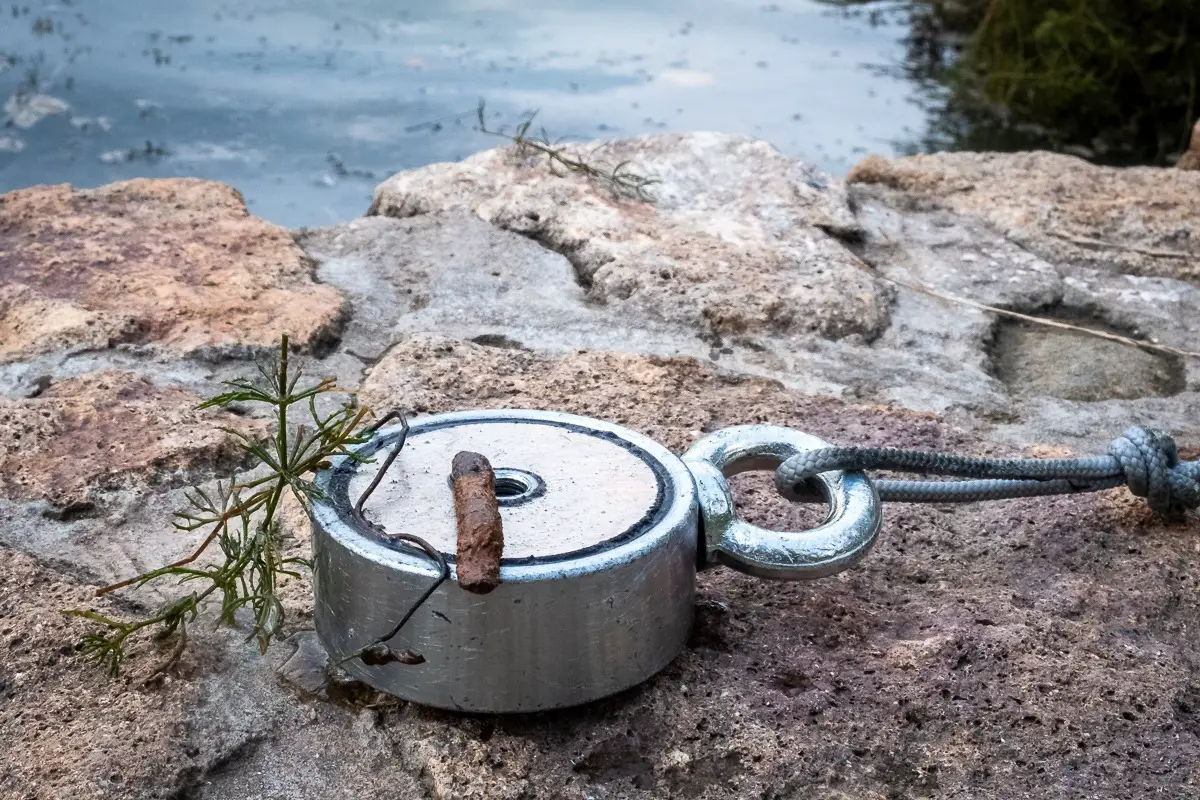Are you ready to embark on an exhilarating treasure hunting experience like no other? Look no further, because this ultimate starter guide to magnet fishing for beginners is here to uncover hidden treasures just waiting to be discovered. Whether you’re an adventure seeker or simply looking for a unique hobby, magnet fishing offers a thrilling twist to the traditional treasure hunt. From sunken relics to forgotten treasures, this guide will provide you with all the essential tips and tricks to get started on your magnet fishing journey. Prepare to unleash your inner explorer and dive into a world of endless possibilities.

MaK., Piny.cz
Where To Buy Magnet Fishing Gear
What is Magnet Fishing?
Definition and Explanation
Magnet fishing is a unique and exciting hobby that involves using a powerful magnet attached to a rope to explore bodies of water, such as lakes, rivers, and canals, in search of hidden treasures. The process is similar to traditional fishing, but instead of catching fish, you’re looking to attract and retrieve metal objects that might be submerged underwater. From discarded bicycles to historical artifacts, the possibilities of what you can find while magnet fishing are truly endless.
History of Magnet Fishing
While the exact origins of magnet fishing are uncertain, the practice has gained popularity in recent years as a recreational outdoor activity. It is believed to have originated in Europe, particularly in countries like England and Germany. The rise of social media and online communities has played a significant role in bringing this hobby to the forefront, allowing magnet fishing enthusiasts to share their finds, experiences, and knowledge with one another.
Getting Started with Magnet Fishing
Choosing the Right Magnet
The success of your magnet fishing adventures greatly depends on selecting the right magnet for the job. Neodymium or rare-earth magnets are the preferred choice due to their strong magnetic force. When choosing a magnet, consider factors such as the pulling force or weight capacity, size, and shape. It is recommended to opt for a double-sided magnet to increase your chances of finding and retrieving objects. Additionally, ensure that the magnet is securely attached to a durable rope for safety purposes.
Selecting a Suitable Rope and Knots
Choosing the appropriate rope is essential for both safety and effectiveness while magnet fishing. Opt for a strong and durable rope that can withstand the water’s conditions and the weight of potential finds. It is advisable to use a braided nylon rope or a paracord, as they offer excellent strength and durability. When it comes to attaching the magnet to the rope, consider using a reliable and secure knot, such as the double fisherman’s knot or the bowline knot, to prevent the magnet from detaching while casting or retrieving.
Understanding Safety Measures
Safety should always be a top priority when engaging in any outdoor activity, and magnet fishing is no exception. Before embarking on your magnet fishing trip, familiarize yourself with safety measures to ensure a pleasant and secure experience. It is crucial to wear gloves to protect your hands from sharp or rusty objects that you may come across. Additionally, make sure to inform someone about your whereabouts and have a first aid kit handy in case of any mishaps. Be cautious when handling potentially dangerous items and dispose of any hazardous materials responsibly.
Get Your Magnet Fishing Gear Here
Finding the Perfect Location
Researching Potential Fishing Spots
To increase your chances of finding valuable or interesting items, thorough research of potential fishing spots is vital. Look for areas that have historical significance, such as old bridges, mills, or docks, as they are more likely to yield exciting discoveries. Online resources, historical maps, and local knowledge can assist you in identifying potential hotspots. Magnet fishing is not restricted to just freshwater; you can also explore coastal regions or even urban areas with permission, keeping safety and legal requirements in mind.
Considering Environmental Factors
While magnet fishing can be an enjoyable pastime, it’s essential to be mindful of the potential impact it can have on the environment. Consider factors such as water pollution and the disturbance of aquatic habitats when choosing your fishing location. Avoid areas that are known for being ecologically sensitive, such as protected wildlife habitats or designated swimming areas. Remember to always collect any trash or debris you encounter during your magnet fishing trip to help maintain the cleanliness of the surrounding environment.
Access Permissions and Legalities
Before setting out on your magnet fishing expedition, it’s crucial to research and understand the local regulations, access permissions, and legalities surrounding magnet fishing. Different countries and regions may have specific laws and guidelines relating to this activity. Some areas may require permits or explicit permission to magnet fish, while others may have restrictions or bans in place. It is your responsibility to respect these regulations and obtain the necessary permissions before diving into the world of magnet fishing.
Preparing for a Magnet Fishing Trip
Assembling the Required Equipment
Properly preparing for your magnet fishing trip will ensure a smooth and enjoyable experience. Apart from the magnet and rope, there are a few other essential items that you should consider including in your kit. Pack a sturdy backpack or bag to carry your equipment and any found items. Bring a pair of waterproof boots or waders to keep your feet dry while wading in water. Additional handy tools include a grappling hook or a rake to help dislodge more significant objects from the water and a waterproof container for storing any valuable discoveries.
Planning the Trip
Planning your magnet fishing trip in advance is crucial for maximizing your chances of success. Start by identifying a suitable date and time, considering factors such as the weather, tides, and daylight hours. Research the local fishing rules and regulations, as well as any restrictions that may affect your chosen location. Plan your route, noting any potential obstacles or hazards along the way. Lastly, inform a friend or family member about your trip details, including your intended location and estimated return time, for added safety and peace of mind.
Checking the Weather Forecast
The weather conditions can greatly impact your magnet fishing experience, so it’s essential to keep a close eye on the weather forecast leading up to your trip. Strong winds, heavy rain, or thunderstorms can make magnet fishing more challenging and potentially dangerous. Avoid fishing during severe weather conditions or when there are risks of flooding. Ideally, choose a day with calm winds, moderate temperatures, and clear skies to ensure a pleasant magnet fishing adventure.
Techniques and Tips for Successful Magnet Fishing for Beginners
Casting and Retrieving Techniques
Mastering the proper techniques for casting and retrieving your magnet is key to a successful magnet fishing trip. When casting, aim to cast your magnet as far as possible while maintaining control over the rope. This will allow you to cover a larger area and increase your chances of finding something interesting. When retrieving, pull the magnet slowly and steadily, keeping the rope taut to avoid losing contact with any potential finds. It can be helpful to move the magnet in different directions while retrieving to cover a wider range.
Detecting Objects and Identifying Finds
Detecting and identifying objects while magnet fishing requires patience and a keen eye. As you retrieve the magnet, pay attention to any changes or sensations in the pull. A sudden increase in weight or resistance could indicate the presence of a metal object. When you’ve retrieved an object, carefully examine it to determine its nature and potential value. Keep in mind that not all finds will be treasures, but each discovery contributes to the excitement and adventure of magnet fishing.
Working with Different Water Conditions
Magnet fishing can be done in various water conditions, including still waters, rivers, and even rough coastal areas. Each type of environment presents its challenges and techniques. In still waters, focus on casting near potential underwater structures or submerged objects. In rivers, areas near bridges or bends tend to accumulate more objects due to the water’s flow. When magnet fishing in coastal areas, pay attention to the tides, as low tide reveals more of the shoreline and potentially exposes hidden treasures.
Safety Precautions and Best Practices
Wearing Protective Gear
Ensuring personal safety while magnet fishing should be a top priority. Wear appropriate protective gear, such as heavy-duty gloves, to protect your hands from sharp or rusty objects. Additionally, consider wearing waterproof boots or waders to keep your feet dry and protected from any hazardous materials that may be present in the water. It is also advisable to wear clothing that covers your skin to minimize the risk of cuts, scrapes, or exposure to harmful substances.
Avoiding Hazardous Areas
While magnet fishing, it is essential to be aware of your surroundings and avoid areas that may pose a danger to both you and the environment. Steer clear of locations that are known for high levels of pollution, such as industrial areas or sites with a history of chemical spills. Be cautious of underwater obstacles, such as submerged rocks or debris, which can cause entanglement or injury. Stay a safe distance away from areas with strong currents or fast-moving water to prevent accidents or drowning incidents.
Properly Disposing of Waste
As a responsible magnet fishing enthusiast, it is crucial to leave the environment as you found it. Dispose of any waste, trash, or debris you encounter during your magnet fishing trip in appropriate bins or trash bags. If you come across hazardous materials, it is essential to handle and dispose of them properly. Do not leave any harmful substances in the water or the surrounding environment. By practicing responsible waste disposal, you contribute to the preservation of nature and the maintenance of clean and safe magnet fishing locations for everyone to enjoy.
What to Expect while Magnet Fishing
Common Finds and Treasures
Magnet fishing can lead to a wide array of finds, ranging from common objects to unique treasures. Some of the more common finds include discarded bicycles, car parts, and coins. Other exciting discoveries can include historical artifacts, antique jewelry, or even weapons. It’s important to note that there is no guarantee of finding valuable items, as magnet fishing is a game of chance. Nevertheless, the thrill of the unexpected can make each trip an exciting and rewarding experience.
Dealing with Trash and Pollution
Unfortunately, not every magnet fishing trip will result in a trove of hidden treasures. Magnet anglers often come across various types of trash and pollution during their outings. It is crucial to adopt a responsible approach by collecting and properly disposing of any trash or debris encountered. By doing so, you contribute to the preservation of the environment and help mitigate the harmful effects of pollution on aquatic life and ecosystems.
The Thrill of Unexpected Discoveries
One of the most exciting aspects of magnet fishing is the thrill of uncovering unexpected discoveries. You never know what lies beneath the water’s surface until you cast your magnet and retrieve it. Each trip holds the potential for surprising and unique finds, turning an ordinary day into an extraordinary adventure. The element of mystery and anticipation makes magnet fishing an exhilarating and addictive hobby for enthusiasts of all ages.
Cleaning and Restoring Found Objects
Safe Handling and Cleaning Techniques
After retrieving objects from the water, it’s important to handle them with care to ensure their preservation and your own safety. Depending on the nature of the find, you may need to clean it to remove dirt, rust, or other impurities. Avoid using harsh chemicals unless necessary and opt for gentle cleaning methods to prevent damage. Be cautious with potentially fragile items and use soft tools, such as brushes or toothpicks, to remove debris. Always wear appropriate protective gear, such as gloves, while handling potentially rusty or sharp objects.
Preserving and Displaying Treasures
If you stumble upon unique or valuable items during your magnet fishing adventures, you may want to consider preserving and displaying them. Artifacts with historical significance or objects with sentimental value can be carefully preserved to maintain their condition and significance. Consider using preservation techniques such as drying, oiling, or coating with protective substances to prevent further deterioration. Displaying your treasures in a shadow box, glass case, or even framing them can showcase your remarkable finds and serve as a conversation starter.
Donating or Selling Valuable Finds
In some cases, you may come across items of significant value or historical importance during your magnet fishing escapades. If you’re not interested in keeping these items yourself, consider donating them to local museums, historical societies, or even schools. These organizations may appreciate the opportunity to preserve and share the objects with others in a meaningful way. Alternately, you may choose to sell valuable finds to collectors or enthusiasts who share your passion for history or unique artifacts.
Etiquette and Responsible Magnet Fishing
Respecting Natural Habitats
As an enthusiast, it is important to practice responsible magnet fishing by respecting natural habitats and ecosystems. Avoid disturbing sensitive areas like coral reefs, underwater plants, or fish spawning grounds. Adhere to designated paths and avoid trampling on vegetation while accessing your fishing location. Act responsibly and maintain a gentle touch to ensure minimal disturbance to the environment, allowing nature to thrive undisturbed.
Being Mindful of Wildlife
Water bodies are home to a diverse range of wildlife, and it’s important to be mindful of their presence while magnet fishing. Avoid causing unnecessary distress or harm to aquatic creatures by being cautious with your movements and minimizing disturbance. Do not attempt to fish in areas known for hosting protected or endangered species, and respect any wildlife protection zones or restrictions in place. By promoting a harmonious interaction between magnet fishing enthusiasts and wildlife, you contribute to the conservation and preservation of these precious ecosystems.
Reporting Significant Finds or Hazardous Materials
If you come across significant historical artifacts, potential archaeological sites, or hazardous materials during your magnet fishing endeavors, it is essential to report them to the appropriate authorities. Local archaeological departments, historical societies, or environmental agencies can provide guidance and assistance in dealing with these findings. Reporting such discoveries not only helps preserve our cultural heritage and protect the environment but also contributes to ongoing research and conservation efforts.
Joining the Magnet Fishing Community
Online Forums and Communities
One of the best ways to connect with fellow magnet fishing enthusiasts is through online forums and communities. Joining dedicated magnet fishing forums or groups allows you to learn from experienced anglers, share your own experiences, and gain valuable insights and advice. These platforms also provide opportunities to ask questions, participate in discussions, and discover new fishing locations. Embrace the sense of camaraderie and foster friendships within the magnet fishing community, where you can share in the joy and excitement of this unique hobby.
Sharing Stories and Experiences
Magnet fishing is a hobby that offers endless stories and experiences to share. Take advantage of social media platforms or personal blogs to document your findings and adventures. Share your favorite finds, tell the story behind each discovery, and showcase your collection of treasures. Engaging with others who share your passion for magnet fishing creates a sense of community and encourages the mutual celebration of successful finds and engaging stories.
Participating in Magnet Fishing Events
Magnet fishing events offer opportunities to meet other enthusiasts in person, exchange tips and tricks, and immerse yourself in the magnet fishing culture. Keep an eye out for magnet fishing gatherings, competitions, or clean-up events in your local area or neighboring regions. Such events often involve like-minded individuals coming together to enjoy a day of magnet fishing and socializing, making it an ideal setting to learn, share experiences, and create lasting memories.
In conclusion, magnet fishing is a fascinating hobby that combines the thrill of treasure hunting with the joy of outdoor exploration. By following the right techniques, taking necessary safety precautions, respecting the environment, and being part of the magnet fishing community, you can embark on exciting adventures and uncover hidden treasures in our watery landscapes. So grab your magnet, find a suitable location, and dive into the world of magnet fishing – an extraordinary journey awaits you!
Shop Now For Magnet Fishing Equipment
Read more tips about gold prospecting here


